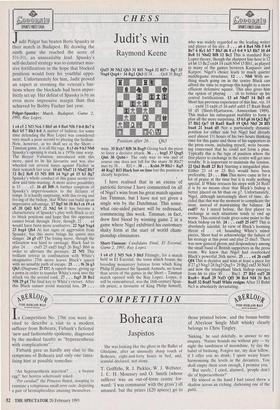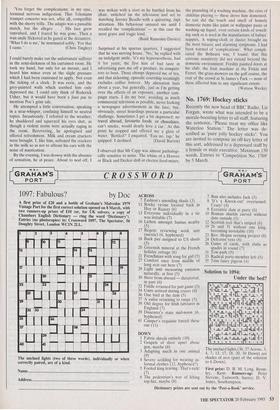COMPETITION
Boheara
Jaspistos
In Competition No. 1766 you were in- vited to describe a visit to a modern sufferer from Boheara, Firbank's fictional 'new and fashionable epidemic, diagnosed by the medical faculty as "hyperaesthesia with complications".'
Firbank gave us hardly any clue to the symptoms of Boheara and only one tanta- lising hint at possible remedies:
'An hyperaesthesia injection? . . . a beaten egg?' her hostess solicitously asked.
'Per caridadr the Princess fluted, stooping to examine a voluptuous small terre cuite, depicting a pair of hermaphrodites amusing themselves.
She was looking like the ghost in the Ballet of Ghislaine, after an unusually sharp touch of Boheara; eight-and-forty hours in bed, and, scandal declared, not alone.
T. Griffiths, R. J. Pickles, W. J. Webster, J. C. H. Mounsey and 0. Smith (whose sufferer was an out-of-form centre for- ward: 'I was communin' with the grass') all amused, but the prizes (£20 apiece) go to
those printed below, and the bonus bottle of Aberlour Single Malt whisky clearly belongs to Chris Tingley.
'Sinking,' he said dolefully, in answer to my enquiry. 'Nature hounds me without pity — by night the tawdriness of moonshine, by day the babel of birdsong. Forgive me, my dear fellow. if I offer you no drink; I spent weary hours harmonising the levels in the decanters. You shall empty them soon enough, I promise you.'
'But surely,' I cried, alarmed, 'people don't die of hyperaesthesia?'
He winced as the hand I had raised threw a shadow across an etching, darkening one of the putti. 'You forget the complications: in my case, terminal nervous indigestion. That Telemann trumpet concerto was not, after all, compatible with the sherry trifle. The adagio was a passable match, but the allegro . . .' His face grew convulsed, and I feared he was gone. Then a wan smile flickered as he gazed at the decanters. `What I do is me,' he murmured softly. 'For that I came.' (Chris Tingley)
I could barely make out the unfortunate sufferer in the semi-darkness of his curtained room. He took my hand, but only for an instant, and I heard him wince even at the slight pressure which I had been cautioned to apply. Not even the ticking of a clock. It was eerie, and the grey-painted walls which soothed him only depressed me. I could only think of Roderick Usher, but it would have been a faux pas to mention Poe's grim tale.
He attempted a little conversation, speaking in a near-whisper, confining himself to neutral topics. Incautiously, I referred to the weather; he shuddered and squeezed his eyes shut, as though a violent storm were actually raging in the room. Recovering, he apologised and offered refreshment. Milk and cream crackers were brought. I, like him, softened the crackers in the milk so as not to affront his ears with the noise of mastication.
By the evening, I was drowsy with the absence of sensation, he at peace. About to nod off, I was woken with a start as he hurtled from his chair, switched on the television and set to watching Jeremy Beadle with a quivering, rapt attention. His behaviour amazed me until I recalled the 'complications' — in this case the most grave and tragic kind.
(Basil Ransome-Davies) Surprised at his spartan quarters, I suggested that he was moving house. 'No,' he replied with an indulgent smile, 'it's my hyperaesthesia, had it for years; the first hint of bad taste in advertising puts me off a product, its competi- tors to boot. Those chimps deprived me of tea, and that sickening, episodic courtship seemingly excludes coffee forever. My alienation lasts about a year, but generally, just as I'm getting over the effects of an exposure, another cam- paign starts. I do my best, avoiding as much commercial television as possible, never looking a newspaper advertisement in the face, but, obviously, street hoardings present a particular challenge. Sometimes I get a bit depressed; no travel abroad, favourite foods or chocolates, can't smoke, would dearly love a car.' At this point he stopped and offered me a glass of water. `Bottled?' I enquired. 'Eau no, tap,' he quipped. I declined. (David Barton) I observed that Mr Capp was almost pathologi- cally sensitive to noise. The whine of a Hoover or Black and Decker drill or electric food-mixer, the pounding of a washing machine, the cries of children playing — these drove him demented. So too did the touch and smell of homely domestic items like paint or wallpaper paste or washing-up liquid, even certain kinds of towell- ing such as is used in the manufacture of babies' nappies. A wiping-cloth or duster brought on the most bizarre and alarming symptoms. I had been warned of 'complications'. What compli- cated the Boheara was, I found, that this extreme sensitivity did not extend beyond the domestic environment. Freshly painted doors at his club, the fruit machine at the Firkin and Ferret, the grass-mowers on the golf course, the roar of the crowd at St James's Park — none of these affected him to any significant extent.
(Watson Weeks)
No. 1769: Hockey sticks
Recently the new head of BBC Radio, Liz Forgan, wrote what was intended to be a morale-boosting letter to all staff, featuring the sentence, 'Please treat my office like Waterloo Station.' The letter was de- scribed as 'pure jolly hockey sticks'. You are invited to compose an off-key letter of this sort, addressed to a depressed staff by a female or male executive. Maximum 150 words. Entries to 'Competition No. 1769' by 5 March.



























































 Previous page
Previous page